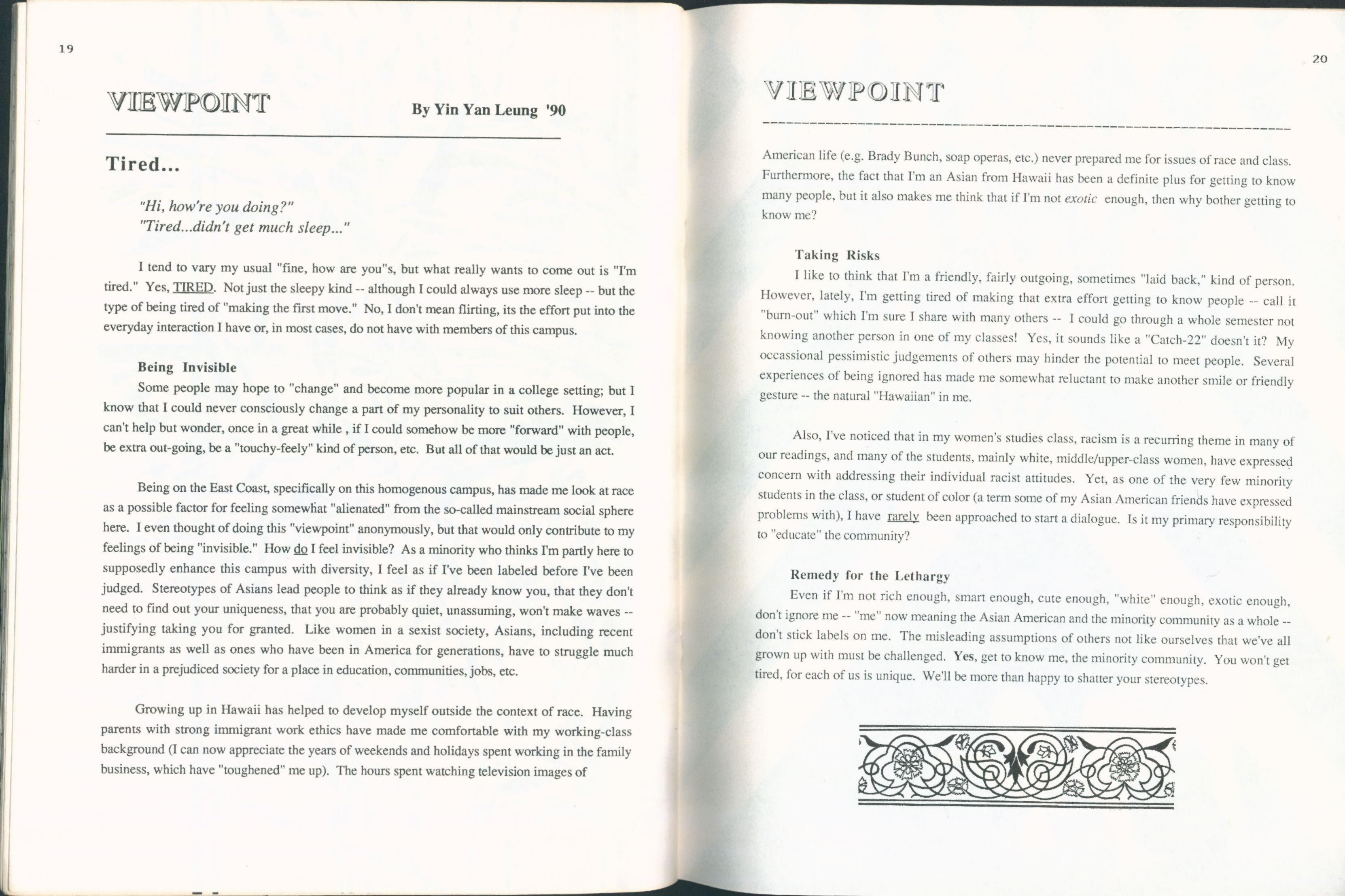
1 minute read
Sikh Mool ("Plants

VIEWPOINT
Advertisement
By Yin Yan Leung '90
Tired...
"Hi, how're you doing?" "Tired...didn't get much sleep..."
I tend to vary my usual "fine, how are you"s, but what really wants to come out is "I'm tired.' Yes, TIRED. Not just the sleepy kind — although I could always use more sleep — but the type of being tired of "making the first move." No, I don't mean flirting, its the effort put into the everyday interaction I have or, in most cases, do not have with members of this campus.
Being Invisible Some people may hope to "change" and become more popular in a college setting; but I know that I could never consciously change a part of my personality to suit others. However, I can't help but wonder, once in a great while , if I could somehow be more "forward" with people, be extra outgoing, be a "touchyfeely" kind of person, etc. But all of that would be just an act.

Being on the East Coast, specifically on this homogenous campus, has made me look at race as a possible factor for feeling somewhat "alienated" from the socalled mainstream social sphere here. I even thought of doing this "viewpoint" anonymously, but that would only contribute to my feelings of being "invisible." How do I feel invisible? As a minority who thinks I'm partly here to supposedly enhance this campus with diversity, I feel as if I've been labeled before I've been judged. Stereotypes of Asians lead people to think as if they already know you, that they don't need to find out your uniqueness, that you are probably quiet, unassuming, won't make waves ~ justifying taking you for granted. Like women in a sexist society, Asians, including recent immigrants as well as ones who have been in America for generations, have to struggle much harder in a prejudiced society for a place in education, communities, jobs, etc.
Growing up in Hawaii has helped to develop myself outside the context of race.
Having parents with strong immigrant work ethics have made me comfortable with my workingclass background (I can now appreciate the years of weekends and holidays spent working in the family business, which have "toughened" me up). The hours spent watching television images of
VIEWPOINT
American life (e.g. Brady Bunch, soap operas, etc.) never prepared me for issues of race and class. Furthermore, the fact that I m an Asian from Hawaii has been a definite plus for getting to know many people, but it also makes me think that if I'm not exotic enough, then why bother getting to know me?
Taking Risks
I like to think that I'm a friendly, fairly outgoing, sometimes "laid back," kind of person. However, lately, I'm getting tired of making that extra effort getting to know people call it burnout which I m sure I share with many others — I could go through a whole semester not
knowing another person in one of my classes! Yes, it sounds like a "Catch22" doesn't it? My
occassional pessimistic judgements of others may hinder the potential to meet people.
Several experiences of being ignored has made me somewhat reluctant to make another smile or friendly gesture the natural "Hawaiian" in me.
Also, I've noticed that in my women's studies class, racism is a recurring theme in many of our readings, and many of the students, mainly white, middle/upperclass women, have expressed concern with addressing their individual racist attitudes. Yet, as one of the very few minority students in the class, or student of color (a term some of my Asian American friends have expressed problems with), I have rarely been approached to start a dialogue. Is it my primary responsibility to "educate" the community?

Remedy for the Lethargy
Even if Im not rich enough, smart enough, cute enough, "white" enough, exotic enough, don t ignore me me now meaning the Asian American and the minority community as a whole — don't stick labels on me. The misleading assumptions of others not like ourselves that we've all grown up with must be challenged. Yes, get to know me, the minority community. You won't get tired, for each of us is unique. We'll be more than happy to shatter your stereotypes.







